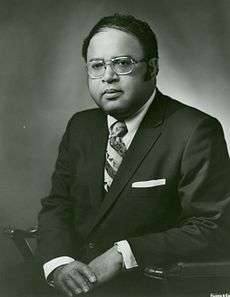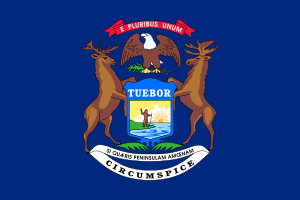Charles Diggs
Charles Coles Diggs Jr. (December 2, 1922 – August 24, 1998[1]) was an American politician from the U.S. state of Michigan who served in the state senate and U.S. House of Representatives. Diggs was an early member of the civil rights movement. He attended the trial of Emmett Till's murderers, and was elected the first chairman of the Congressional Black Caucus. He was a staunch critic of the apartheid regime in South Africa.
Charles Diggs | |
|---|---|
 | |
| Chair of the House District of Columbia Committee | |
| In office January 3, 1973 – January 3, 1979 | |
| Preceded by | John L. McMillan |
| Succeeded by | Ron Dellums |
| Member of the U.S. House of Representatives from Michigan's 13th district | |
| In office January 3, 1955 – June 3, 1980 | |
| Preceded by | George D. O'Brien |
| Succeeded by | George Crockett Jr. |
| Member of the Michigan Senate from the 3rd district | |
| In office 1951–1954 | |
| Preceded by | Henry Kozak |
| Succeeded by | Cora Brown |
| Personal details | |
| Born | Charles Coles Diggs Jr. December 2, 1922 Detroit, Michigan, U.S. |
| Died | August 24, 1998 (aged 75) Washington, D.C., U.S. |
| Political party | Democratic |
| Spouse(s) | |
| Education | University of Michigan Fisk University Wayne State University (BS) Michigan State University |
| Military service | |
| Allegiance | |
| Branch/service | |
| Years of service | 1943–1945 |
| Battles/wars | World War II |
Diggs resigned from the United States House of Representatives and served 14 months of a three-year sentence for mail fraud, although he maintained his innocence. He was the first African American elected to Congress from Michigan.
Early life
Born in Detroit, Charles was the only child of Mayme E. Jones Diggs, and Charles Diggs Sr. He attended the University of Michigan, Detroit College of Law (1952-52) and Fisk University.[2] He served in the United States Army from 1943 to 1945. After his discharge, Diggs worked as a funeral director. He served as a member of the Michigan State Senate from the 3rd district 1951-54, just as his father had from 1937 to 1944.
He was rooted in his family's business, the House of Diggs, which at one time was said to be Michigan's largest funeral home.[3]
Political career
In 1954, Diggs defeated incumbent U.S. Representative George D. O'Brien in the Democratic Party primary elections for Michigan's 13th congressional district. He went on to win the general election to the 84th Congress and was subsequently re-elected to the next twelve Congresses, serving from January 3, 1955, until his resignation June 3, 1980.
The first African American to be elected to Congress in Michigan, Diggs made significant contributions to the struggle for civil rights. In April 1955, he gave a well received speech to a crowd of about 10,000 in Mound Bayou, Mississippi, at the annual conference of the Regional Council of Negro Leadership (RCNL), probably the largest civil rights group in the state. His host was the RCNL's leader, Dr. T.R.M. Howard, a wealthy black surgeon and entrepreneur.[4]
The same year that he was sworn into congress, Diggs received national attention as the only congressman to attend and monitor the trial of the accused killers of Emmett Till, a black teenager from Chicago who was murdered during a trip to the state. The outrage generated by the case gave a tremendous momentum to the emerging civil rights movement. Although he was a member of Congress, the sheriff did not exempt him from Jim Crow treatment. Diggs had to sit at a small table along with black reporters.[4] Following the trial, he continued the fight for justice, calling upon President Eisenhower to call a special session of congress to consider civil rights.[5]
In 1969, Diggs was appointed to the post of Chairman of the Subcommittee on Africa of the Committee on Foreign Affairs, where he strongly advocated ending Apartheid in South Africa. He was a committed publicist for the liberation cause in South Africa, and his 'Action Manifesto' (1972) displayed his support for the armed struggle against Apartheid. In it, Diggs criticized the United States government for decrying the use of such violence when it failed to condemn measures used by the South African government to subjugate the majority of its own people.[6] Diggs also argued that American corporations were propping up the apartheid government through their investments, and he was banned from South Africa for these positions.[7]
Diggs was additionally a founding member and the first chairman of the Congressional Black Caucus, a group of African American representatives and senators working to address the needs and rights of black constituents. While chairman, Diggs successfully led a caucus boycott of President Nixon's State of the Union Address, following Nixon's refusal to meet to discuss issues relevant to African Americans.[8] This and similar work contributed to Diggs being named on the Master list of Nixon political opponents.
In March 1978, Diggs was charged with taking kickbacks from staff whose salaries he raised. He was convicted on October 7, 1978, on 11 counts of mail fraud[9] and filing false payroll forms. Diggs insisted he had done nothing wrong, and was re-elected while awaiting sentencing. He was censured by the House on July 31, 1979, and resigned from Congress June 3, 1980.[9] He was sentenced to three years in prison and served 14 months.
Personal life
Diggs was a member of Mount Sinai Holy Church of America founded by Bishop-Mother Ida B. Robinson.
Diggs died of a stroke at Greater Southeast Community Hospital in Washington, D.C. He is interred at Detroit Memorial Park in Warren, Michigan.[10]
See also
- List of African-American United States Representatives
- List of American federal politicians convicted of crimes
- List of United States Representatives expelled, censured, or reprimanded
References
- Haskins, James, Distinguished African American Political and Governmental Leaders. Oryx Press (1999), p.67. ISBN 9781573561266
- "Diggs, Charles C., Jr. (1922-1998)". Martin Luther King Jr. And the Global Struggle for Freedom. Retrieved December 4, 2019.
- Pearson, Richard, Staff Writer (August 26, 1998). "Charles Diggs Dies at 75". Washington Post. p. B06. Retrieved May 3, 2014.
- David T. Beito and Linda Royster Beito, Black Maverick: T.R.M. Howard's Fight for Civil Rights and Economic Power (Urbana: University of Illinois Press, 2009) ISBN 0-252-03420-1.
- Congressional Record, V. 144, PT. 14, September 9, 1998 to September 21, 1998
- James Sanders, South Africa and the International Media (London, 2000).
- Nixon, Ron (2016). South Africa's Global Propaganda War. London, U.K.: Pluto Press. p. 48. ISBN 9780745399140. OCLC 959031269.
- Clemons, M.L. (2010). African Americans in Global Affairs: Contemporary Perspectives. University Press of New England.
- Rudin, Ken (2007-06-06). "The Equal-Opportunity Culture of Corruption". NPR.org. Retrieved 2007-07-29.
- Warikoo, Niraj. "Advocate of civil rights in Congress". Detroit Free Press. Archived from the original on February 3, 1999.
External links
| Wikisource has original works written by or about: Charles Diggs |
- United States Congress. "Charles Diggs (id: D000344)". Biographical Directory of the United States Congress.
- The Political Graveyard
- Congressional Bad Boys
- Charles Diggs at Find a Grave
| U.S. House of Representatives | ||
|---|---|---|
| Preceded by George D. O'Brien |
Member of the U.S. House of Representatives from Michigan's 13th congressional district 1955–1980 |
Succeeded by George Crockett Jr. |
| New office | Chair of the Congressional Black Caucus 1969–1972 |
Succeeded by Louis Stokes |
| Preceded by John L. McMillan |
Chair of the House District of Columbia Committee 1973–1979 |
Succeeded by Ron Dellums |

